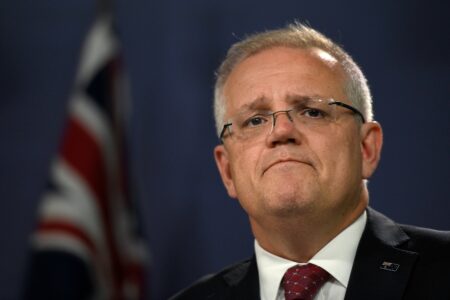
Scott Morrison
Written by Dr. Binoy Kampmark.
It was startling and even shocking. Away from the thrust and cut of domestic politics, not to mention noisy discord within his government’s ranks, Australian Prime Minister Scott Morrison could breathe a sign of relief. Perhaps no one would notice in Washington that Australia remains prehistoric in approaching climate change relative to its counterparts. Being known in his own country as “Scotty from Marketing”, he just might pull it off.
Besides, a security pact with the United States and the United Kingdom had just been cemented, one promising Canberra eight submarines with nuclear propulsion. That these promised to be eye-wateringly expensive and available sometime in the 2040s, were they to ever make it to water, was a point not even worth considering.
In the US press, Morrison was careful to toe the line of the partner made supplicant. On CBS’s Face the Nation, he was asked whether the US and its allies were moving towards conflict with Beijing. “I don’t think it’s inevitable at all,” he chirped, claiming that it was “in everybody’s interest” that we all co-exist. But this “happy co-existence” was premised on keeping China in the box or, as he preferred to put it, a committed role of “free nations like Australia” and others in the Indo-Pacific region to stay vigilant.
On climate change, he was also pressed on having not “given a timeline” on placing Australia on the path to net zero emissions. He admitted this to be the case and vacillated. Slipping back into advertising mode, Morrison said that “performance matters” for Australia. The net zero target was being pursued, and would be achieved “preferably by 2050.” The usual half-baked assurances followed: Australia’s record was “strong”. “We’ve already reduced emissions in Australia by over 20 percent since 2005. We committed to Kyoto. We met that target and beat that target.” As for the Paris target? Not an issue: Australia would romp it.
At that point, CBS’s Margaret Brennan could only observe that no country had actually delivered on such targets. Hardly a problem, came Morrison’s reply to the bubble’s bursting. “See, it’s one thing to have a commitment, but in Australia, you’re not taken seriously unless you’ve got a plan to achieve the commitment.” This was delightful coming from a Prime Minister who has no plans to speak off when it comes to dealing with climate change. In fact, Morrison’s tenure has been marked by an absence of plans on any major policy decision. When any have been proposed – the vaccine rollout being the conspicuous example – they have been spectacular failures.
In a press conference given on September 24, Morrison pursued his favourite theme in colouring Australia’s lamentable contribution to the global climate debate: technology. Australia is never the laggard in Morrison’s environmental cosmos. Developing countries, he insisted, should be the priority, which was another way of saying that they were the problem. “If we want to address climate change, then we need to address the change that is necessary in developing economies, so they can grow their economies, build their industries, make the things the world needs.” For any difference to be worthwhile, “we’ve got to make a difference everywhere”.
Such a slanted view found its mark. House Speaker Nancy Pelosi was taken by a flight of fancy in thinking that Morrison was doing something special. In welcoming the Australia prime minister to the Capitol, Pelosi considered the AUKUS security pact “pretty exciting” and thanked Morrison for showing “leadership” on the issue of climate change.
The next day, Pelosi latched on to Morrison’s remarks about the Paris targets in her weekly press conference with candy-grabbing enthusiasm. Both the UK’s Boris Johnson and Morrison were “so exuberant about the urgency of addressing the climate issues.” But it was the Australian who impressed with his slogan “We Meet It and We Beat It.” That was enough for the Speaker: “they’re leading the way, and that’s what we all have to do” namely “meet our emissions responsibility and our financial responsibility to other countries so that when we leave COP26, having fulfilled our obligations to the Paris Accords, and then go further.”
Such glaringly superficial assessments can be put down to the fanfare that accompanies visiting dignitaries from freedom land’s outposts. Morrison was particularly fortunate on that score, winning over his hosts with a shameless slogan that sounded hopelessly electoral and starkly mendacious.
Which takes us to the next point: Pelosi and company have proved to be something of a sounding board for the next Australian federal election. Morrison’s action on climate change will be minimal, but that will be irrelevant in a number of electoral battlegrounds. Having a slogan, writes Sean Kelly, a former advisor to two previous Australian Labor Prime Ministers, will be acceptable to “a remarkable number of people, as an acceptable substitute for reality – just as it was in America last week.” The Australian Labor Party, still languishing in hopeless opposition, have every reason to be worried.
Dr. Binoy Kampmark was a Commonwealth Scholar at Selwyn College, Cambridge. He lectures at RMIT University, Melbourne. Email: bkampmark@gmail.com






Another stooge is service to london and ultimately rome. The Chinese have overland routes built into the Belt and Road Initiative. Perhaps the aussies forgot who they are dealing with.